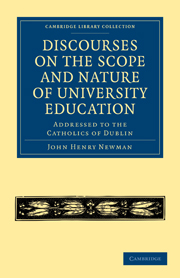Book contents
- Frontmatter
- PREFACE
- Contents
- CORRIGENDA
- Discourse I Introduction
- Discourse II Theology a Branch of Knowledge
- Discourse III Bearing of Theology on other Branches of Knowledge
- Discourse IV Bearing of other Branches of Knowledge on Theology
- Discourse V General Knowledge viewed as One Philosophy
- Discourse VI Philosophical Knowledge its own end
- Discourse VII Philosophical Knowledge viewed in relation to Mental Acquirements
- Discourse VIII Philosophical Knowledge viewed in relation to Professional
- Discourse IX Philosophical Knowledge viewed in relation to Religion
- Discourse X Duties of the Church towards Philosophy
- Appendix
Discourse V - General Knowledge viewed as One Philosophy
Published online by Cambridge University Press: 05 July 2011
- Frontmatter
- PREFACE
- Contents
- CORRIGENDA
- Discourse I Introduction
- Discourse II Theology a Branch of Knowledge
- Discourse III Bearing of Theology on other Branches of Knowledge
- Discourse IV Bearing of other Branches of Knowledge on Theology
- Discourse V General Knowledge viewed as One Philosophy
- Discourse VI Philosophical Knowledge its own end
- Discourse VII Philosophical Knowledge viewed in relation to Mental Acquirements
- Discourse VIII Philosophical Knowledge viewed in relation to Professional
- Discourse IX Philosophical Knowledge viewed in relation to Religion
- Discourse X Duties of the Church towards Philosophy
- Appendix
Summary
It is a prevalent notion just now, that religious opinion does not enter, as a matter of necessity, in any considerable measure, into the treatment of scientific or literary subjects. It is supposed, that, whatever a teacher's persuasion may be, whether Christian or not, or whatever kind or degree of Christianity, it need not betray itself in such lectures or publications as the duties of his office require. Whatever he holds about the Supreme Being, His attributes and His works, be it truth or error, does not make him better or worse in experiment or speculation. He can discourse upon plants, or insects, or birds, or the powers of the mind, or languages, or historical documents, or literature, or any other such matter of fact, with equal accurateness and profit, whatever he may determine about matters which are entirely distinct from them.
In answer to this representation I contended last week, that a positive disunion takes place between Theology and Secular Science, whenever they are not actually united. Here, not to be at peace is to be at war; and for this reason: — The assemblage of Sciences, which together make up Universal Knowledge, is not an accidental or a varying heap of acquisitions, but a system, and may be said to be in equilibrio, as long as all its portions are secured to it. Take away one of them, and that one so important in the catalogue as Theology, and disorder and ruin at once ensue.
- Type
- Chapter
- Information
- Discourses on the Scope and Nature of University EducationAddressed to the Catholics of Dublin, pp. 135 - 166Publisher: Cambridge University PressPrint publication year: 2010First published in: 1852

